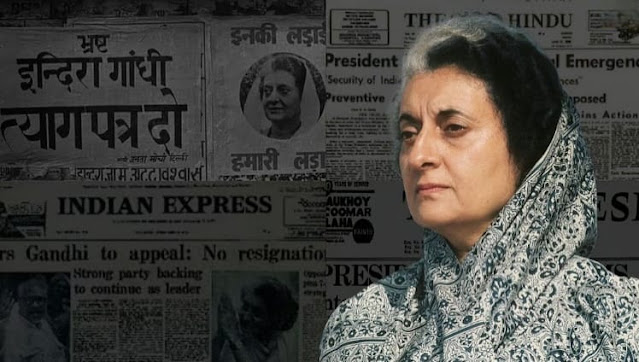25th June, 1975…. A black day in the history of independent India. India became independent from the clutches of British rule in 1947. Three years later, the republic of India was formed on the basis of the Constitution. The darkest chapter called Emergency began in the same year when the republic of India was celebrating its Silver Jubilee. This chapter stifled the freedom of expression of Indian citizens, but more than that, it also became a witness to horrific abuse of power by the government. The Emergency was imposed on the country within just 13 days after the then Prime Minister Indira Gandhi’s election to the Lok Sabha from Raebareli constituency in 1971 was declared void by the Chief Justice of Allahabad High Court, Jagmohanlal Sinha.
All the fundamental rights granted by
the Constitution to common citizens and newspapers were curtailed. The
excessive suppression by the government machinery was so horrific that even the
British would be ashamed. There was no social media or internet in those days.
The two state-owned media platforms, Akashvani and Doordarshan, were the only
source of information. Doordarshan had just started, so its reach was limited.
Not even a single line of news regarding
opposition meetings, demonstrations or speeches held against the Emergency was
reported by these state owned platforms. The Indira Gandhi government ensured
that no news against the government reached the public by censoring newspapers.
Even the British, who had a pride that the Sun never sets on the British
Empire, had to leave India. Destiny made even Indira Gandhi pay the price for
imposing the Emergency. But by then Indian people had suffered a lot because of
one individual’s lust for power. That period made Indians understand how great
the value of freedom of writing and freedom of speech is.
The electricity to all newspaper offices
in Delhi, the capital of the country, was cut off before the President signed
the ordinance of Emergency. All important leaders of opposition including the
leaders of Bharatiya Jana Sangh, Socialist party were arrested immediately.
Indira Gandhi and Sanjay Gandhi, two key players of the Emergency, knew exactly
what they wanted to do during the Emergency. Mrs Indira Gandhi imposed the
Emergency fearing that the court verdict would force her to give away her Prime
Ministerial post. The entire nation witnessed the cruel dictator in Indira
Gandhi in the form of horrific abuse of power during that period. The
dictatorship was so terrible that newspapers had to show every single line to
the government officials. Newspapers could not be sent for printing without
approval of government officials.
Government officials would only allow
newspapers to be printed after ensuring that not a single word has been written
against Mrs Indira Gandhi or Emergency. The censorship was imposed on the
freedom of press to prevent information about the cruel acts committed during
the emergency from reaching the common people. Even artists, actors were hit by
this dictatorship. Songs of Kishore Kumar, who refused to sing a song praising
the Emergency, were banned from broadcasting on Akashvani and Doordarshan. Notices
were sent to Kishore Kumar through the Income Tax Department. But Kishore Kumar
still did not succumb. Dev Anand was also harassed in many ways because of his
refusal to issue a statement in support of the Emergency.
Barbaric acts were committed in the form
of forced sterilization while carrying out a family planning campaign aimed at
controlling the country’s population. Government officials were given the
target of family planning surgeries. Many unmarried men were also forcibly
sterilized to achieve this target. Journalists and intellectuals also remained
silent against the torture during the Emergency. Opposition party workers were
being imprisoned without enquiry. Even many senior leaders of Congress like
Yashwantaro Chavan, Babu Jagjivan Ram, Brahmananda Reddy did not dare to utter
a single word against Indira Gandhi.
The proposal to impose a state of
emergency was sent to the President for signature without seeking an approval
of the Union Cabinet. But Rashtriya Swayamsevak Sangh, Jana Sangh ran a
nationwide campaign without paying any heed to Indira Gandhi’s suppression.
Thousands of swayamsevaks of Rashtriya Swayamsevak Sangh staged protests
against the Emergency across the country without fearing imprisonment.
Thousands of people lost their jobs, their lives were shattered due to this.
More than 10 lakh people were arrested across the country. Family members of
senior socialist leader George Fernandes were severely harassed as the police
failed to trace him. Police force was used extensively to suppress voices
against the Emergency. Even elderly leader like Loknayak Jayaprakash Narayan,
who led the fight against Mrs Indira Gandhi, was not spared from imprisonment.
Indian people experienced the Emergency
for 21 months, i.e. from June 25, 1975 to March 21, 1977. Karnataka actress
Snehalatha Reddy died due to torture during the Emergency. A law like ‘MISA’
was passed to arrest opposition party workers and leaders. Renowned director
and writer Gulzar’s film Aandhi was banned because the heroine’s costume
resembled that of Indira Gandhi.
All the brutality was avenged by the
voters in the 1977 Lok Sabha elections. By defeating Congress along with Indira
Gandhi and Sanjay Gandhi, voters brought about a bloodless revolution. The new
generation must know this dark history and therefore the events of that period
should be reminded. Rahul Gandhi, grandson of Mrs. Indira Gandhi, keeps on
whining in the name of the constitution. But while citing the Constitution, he
does not remember the torture of the common man during the Emergency by his own
grandmother. The public memory is very short and therefore even the common man
has to be reminded again and again of what happened during the Emergency. But
Indian democracy emerged victorious after whatever Indian people had endured
during that period. There is no doubt that the fight waged by the Indian people
to defend the Constitution will be recorded in golden letters in Indian
history.
(Article
Pre-Published in Times of India Online – 23 June,
2025)
Keshav
Upadhye, Chief Spokesperson



No comments:
Post a Comment